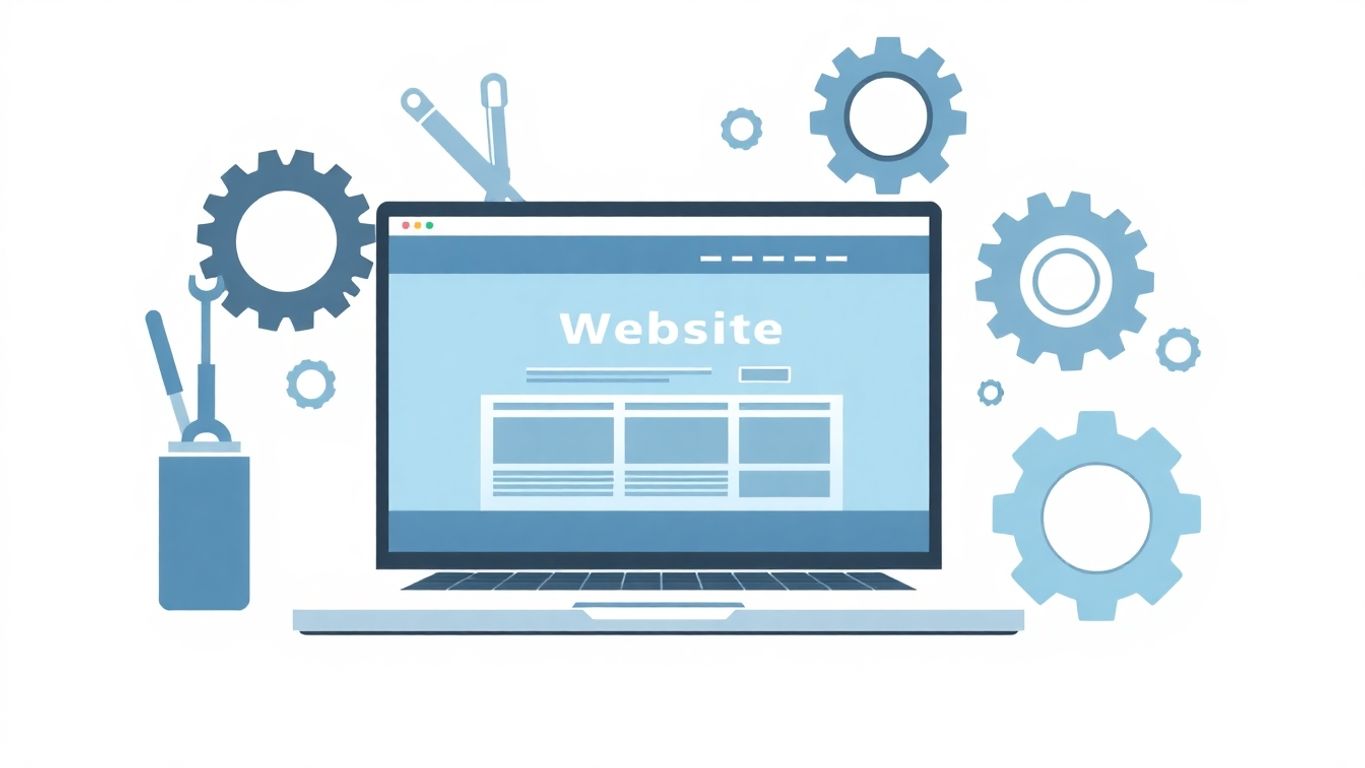Table of Contents
Websites can face many problems that affect their performance and user experience. Understanding these common issues and how to fix them is essential for any website owner. This article explores typical website problems and how management services can help resolve them effectively. From ensuring security to enhancing performance, management services play a crucial role in keeping websites running smoothly.
Key Takeaways
- Website issues can lead to lost customers and damage to brand reputation.
- Management services help keep websites secure from threats like malware and hacking.
- Regular updates and maintenance are key to improving website speed and performance.
- Choosing the right management service can enhance user experience and site functionality.
- Effective management services can assist with SEO optimization to improve search visibility.
Understanding Common Website Issues
Why Websites Break
Websites can break for many reasons, and it’s important to understand them. Common causes include server issues, coding errors, and outdated plugins. Here are a few reasons why your website might not be working:
- Server downtime
- Incorrect URL links
- Software updates that cause conflicts
Impact of Website Issues on Businesses
When your website has problems, it can hurt your business. Users may leave your site if it’s slow or broken, leading to lost sales. Here are some impacts:
- Decreased customer trust
- Lower conversion rates
- Negative brand reputation
Identifying Website Problems Early
Finding issues early can save you time and money. Here are some tips to help you spot problems:
- Regularly check website speed and performance
- Use tools to monitor uptime
- Gather user feedback to identify pain points
Keeping an eye on your website can prevent small issues from becoming big problems.
The Role of Management Services in Website Maintenance
What Are Website Management Services?
Website management services are professional solutions that help you keep your website running smoothly. They handle everything from updates to security, ensuring your site is always in top shape. By using these services, you can focus on your business while experts take care of your website.
Benefits of Professional Website Management
- Time-Saving: You can spend more time on your business instead of worrying about website issues.
- Expertise: Professionals know the best practices for keeping your site secure and efficient.
- Improved Performance: Regular maintenance can enhance your website’s speed and functionality.
Choosing the Right Management Service
When selecting a management service, consider the following:
- Reputation: Look for reviews and testimonials from other clients.
- Services Offered: Ensure they provide the specific services you need, like security and content updates.
- Support: Check if they offer reliable customer support for any issues that may arise.
Managing a website can be overwhelming, but with the right management services, you can ensure your site remains effective and secure.
Improving Website Speed and Performance
Common Causes of Slow Websites
Slow websites can be a real headache for users. Here are some common reasons why your site might be dragging its feet:
- Large image files that take too long to load.
- Excessive code that clutters your website.
- Hosting issues that slow down server response times.
A slow website can frustrate users and lead to lost visitors.
Tools to Test Website Speed
To keep your website running smoothly, you can use various tools to check its speed. Here are some popular options:
- Google PageSpeed Insights
- GTmetrix
- Pingdom
These tools will not only measure your website’s speed but also provide suggestions for improvement.
How Management Services Enhance Performance
Management services can play a crucial role in boosting your website’s performance. Here’s how:
- Regularly optimizing images to ensure they load quickly.
- Minimizing code to reduce the size of your web pages.
- Implementing caching techniques to speed up load times.
Keeping your website fast is essential for a good user experience. Regular maintenance can help you avoid slowdowns and keep your visitors happy.
Ensuring Website Security
Common Security Threats to Websites
Websites face various security threats that can harm both the site and its users. Here are some common issues:
- Malware: Harmful software that can damage your site or steal information.
- Hacking Attempts: Unauthorized access to your website can lead to data breaches.
- Phishing: Fraudulent attempts to obtain sensitive information by pretending to be a trustworthy source.
Importance of Regular Security Audits
Regular security audits are crucial for keeping your website safe. They help you:
- Identify vulnerabilities before they can be exploited.
- Ensure compliance with security standards.
- Maintain user trust by protecting their data.
How Management Services Protect Your Site
Management services play a vital role in website security. They can help you by:
- Implementing strong security measures, such as firewalls and SSL certificates.
- Regularly updating software to patch security holes.
- Monitoring your site for suspicious activity and responding quickly to threats.
Keeping your website secure is not just about protecting your data; it’s about building trust with your users. A secure website encourages visitors to engage and transact confidently.
Fixing Broken Links and Errors
Identifying Broken Links
Broken links can be a major issue for your website. They can frustrate users and hurt your site’s credibility. Here are some common ways to identify broken links:
- Use online tools: There are many free tools available that can scan your website for broken links.
- Check manually: Click through your website and look for any links that lead to a 404 error page.
- Review your analytics: Look for pages with high bounce rates, as they may contain broken links.
Tools for Fixing Website Errors
Once you’ve identified broken links, it’s time to fix them. Here are some tools that can help:
- Google Search Console: This tool helps you find crawl errors and broken links.
- Screaming Frog: A desktop program that crawls your website and identifies broken links.
- Ahrefs: A comprehensive SEO tool that can also help you find and fix broken links.
Role of Management Services in Error Resolution
Management services play a crucial role in fixing broken links and errors. They can help you:
- Regularly monitor your website for issues.
- Quickly resolve any broken links or errors that arise.
- Implement strategies to prevent future issues.
Keeping your website free of broken links is essential for maintaining a positive user experience and ensuring your site runs smoothly.
Enhancing User Experience
Importance of User-Friendly Design
Creating a user-friendly design is essential for keeping visitors engaged. A well-designed website can make users feel comfortable and encourage them to explore more. Here are some key elements to consider:
- Clear Navigation: Make sure users can easily find what they are looking for.
- Responsive Design: Ensure your website looks good on all devices, especially mobile.
- Fast Loading Times: Users are likely to leave if your site takes too long to load.
How Website Issues Affect User Experience
Website problems can lead to frustration and confusion. Common issues include:
- Cluttered Layouts: Too much information can overwhelm users.
- Poor Readability: Hard-to-read fonts or low contrast can make it difficult for users to consume content.
- Lack of Feedback: Users need to know their actions are being registered, like when they click a button.
Management Services for UX Improvement
Management services can help enhance user experience by:
- Conducting regular usability tests to identify issues.
- Implementing user feedback to make necessary changes.
- Providing ongoing support to ensure your website remains user-friendly.
Improving user experience is not just about aesthetics; it’s about making your website functional and enjoyable for everyone.
Keeping Content Fresh and Relevant
Why Content Freshness Matters
Keeping your website’s content updated is essential. Fresh content not only attracts visitors but also helps improve your search engine ranking. Regular updates signal to search engines that your site is active and relevant.
Strategies for Regular Content Updates
To maintain a lively website, consider these strategies:
- Set a content calendar: Plan when to update or add new content.
- Engage with your audience: Use feedback and comments to inspire new topics.
- Repurpose old content: Update existing articles with new information or formats.
Role of Management Services in Content Management
Management services can help you keep your content fresh by:
- Scheduling regular updates to ensure your site remains current.
- Analyzing user engagement to understand what content resonates with your audience.
- Implementing SEO best practices to enhance visibility and reach.
Regularly refreshing your website’s content is not just about keeping it interesting; it’s about building trust and keeping your audience engaged.
Managing Website Backups and Restorations
Importance of Regular Backups
Backing up your website is crucial. If something goes wrong, having a backup can save you a lot of trouble. Regular backups ensure that you can restore your site to its previous state without losing important data. Here are some key reasons to back up your website:
- Protect against data loss due to hacking or malware.
- Easily recover from accidental changes or deletions.
- Ensure business continuity in case of server failures.
Tools for Website Backup
There are several ways to back up your website. Here are some popular options:
- Manual Backup: Download your website files and database directly.
- Backup Plugins: Use plugins that automate the backup process.
- Hosting Provider Services: Many hosting companies offer backup services as part of their plans.
How Management Services Handle Data Loss
Management services play a vital role in ensuring your website is backed up and can be restored quickly. They typically:
- Schedule regular backups to keep your data safe.
- Monitor the backup process to ensure it runs smoothly.
- Provide support for restoring your website in case of data loss.
Regular backups are not just a safety net; they are a vital part of your website management strategy. Keeping your data safe means you can focus on growing your business without worry.
Optimizing for Search Engines
Common SEO Issues
When it comes to search engine optimization (SEO), there are several common issues that can affect your website’s visibility. Here are a few to keep in mind:
- Slow page speed: Users expect websites to load quickly. If your site takes too long, visitors may leave before it even loads.
- Duplicate content: Having the same content on multiple pages can confuse search engines and hurt your rankings.
- Missing or unoptimized meta descriptions: These short snippets help describe your page in search results. If they’re not optimized, you might miss out on clicks.
How Website Problems Affect SEO
Website issues can significantly impact your SEO efforts. Here’s how:
- Lower rankings: Search engines may rank your site lower if it has technical problems.
- Reduced traffic: If your site isn’t showing up in search results, fewer people will visit.
- Poor user experience: Issues like broken links or slow loading times can frustrate users, leading them to leave your site.
Management Services for SEO Optimization
Management services can help you tackle these SEO challenges effectively. Here’s what they can do:
- Conduct regular audits: They can identify and fix issues that may be hurting your SEO.
- Optimize content: They ensure your content is fresh, relevant, and keyword-rich.
- Monitor performance: They track your site’s performance and make adjustments as needed.
Remember, optimizing your website for search engines is an ongoing process. Regular maintenance and updates are key to staying ahead in the digital landscape.
Monitoring and Reporting Website Performance
Key Metrics to Monitor
To keep your website running smoothly, you need to track certain key metrics. Here are some important ones to keep an eye on:
- Page Load Time: How fast your pages load can affect user experience and SEO.
- Bounce Rate: This shows the percentage of visitors who leave after viewing only one page.
- Traffic Sources: Understanding where your visitors come from helps you focus your marketing efforts.
Tools for Performance Tracking
Using the right tools can make monitoring your website easier. Here are some popular options:
- Google Analytics: Great for tracking user behavior and traffic sources.
- GTmetrix: Helps analyze your website’s speed and performance.
- Pingdom: Offers uptime monitoring and performance insights.
How Management Services Provide Insights
Management services play a crucial role in keeping your website healthy. They can help by:
- Regularly checking your website’s performance metrics.
- Providing detailed reports on traffic and user behavior.
- Offering recommendations for improvements based on data analysis.
Remember, monitoring your website is not just about fixing problems; it’s about understanding your audience and improving their experience.
Addressing Website Accessibility Issues
Understanding Accessibility Standards
Accessibility standards are guidelines that help make websites usable for everyone, including people with disabilities. Following these standards ensures that your website can be accessed by a wider audience. Here are some key points to consider:
- Use clear and simple language.
- Provide text alternatives for images.
- Ensure that all interactive elements can be navigated using a keyboard.
Common Accessibility Problems
Many websites face accessibility issues that can prevent users from having a good experience. Some common problems include:
- Missing alternative text for images.
- Poor color contrast between text and background.
- Inaccessible forms that cannot be filled out by keyboard users.
Role of Management Services in Ensuring Accessibility
Management services can help you address accessibility issues effectively. They can:
- Conduct accessibility audits to identify problems.
- Provide recommendations for improvements.
- Assist in implementing changes to meet accessibility standards.
Ensuring your website is accessible not only helps you reach more users but also builds trust and loyalty among your audience.
Planning for Website Scalability
Why Scalability Matters
When you plan for your website’s growth, you ensure it can handle more visitors and content without crashing. A scalable website can adapt to increasing demands smoothly. This means your site will remain fast and functional even as your audience grows.
Challenges in Scaling Websites
Scaling a website can come with its own set of challenges:
- Increased Traffic: More visitors can slow down your site if not managed properly.
- Content Management: Adding new content regularly can become overwhelming.
- Technical Issues: More features can lead to more bugs and errors.
How Management Services Assist in Scalability
Management services can help you scale your website effectively by:
- Optimizing Performance: They ensure your site runs smoothly under heavy traffic.
- Regular Updates: They keep your content fresh and relevant, which is crucial for user engagement.
- Monitoring Tools: They use tools to track performance and identify issues before they become problems.
Planning for scalability is not just about adding more space; it’s about creating a seamless experience for your users as your website grows.
Wrapping It Up: Keeping Your Website in Top Shape
In conclusion, managing your website is essential for its success. By regularly updating content, fixing technical issues, and ensuring security, you can create a positive experience for your visitors. Remember, a well-maintained website not only attracts more users but also builds trust and credibility for your brand. Don’t hesitate to reach out for help if you need it. With the right management services, you can keep your website running smoothly and effectively, allowing you to focus on what you love most about your business.
Frequently Asked Questions
What are common reasons websites stop working?
Websites can break for various reasons, like server issues, coding errors, or problems with plugins.
How can website problems affect my business?
If a website has issues, it can drive customers away, hurt sales, and damage your reputation.
What should I do if I find a broken link on my site?
You should fix broken links as soon as possible, either by removing them or redirecting them to the right page.
How often should I update my website content?
It’s good to update your website content regularly, at least once a month, to keep it fresh and engaging.
What are the benefits of hiring a website management service?
Website management services help keep your site secure, running smoothly, and looking great, saving you time and effort.
How can I improve my website’s loading speed?
You can improve loading speed by optimizing images, reducing the number of plugins, and using a reliable hosting service.
What steps should I take to secure my website?
To secure your website, use strong passwords, keep software updated, and consider using security plugins.
Why is user experience important for my website?
A good user experience keeps visitors on your site longer and encourages them to return, which can lead to more sales.









